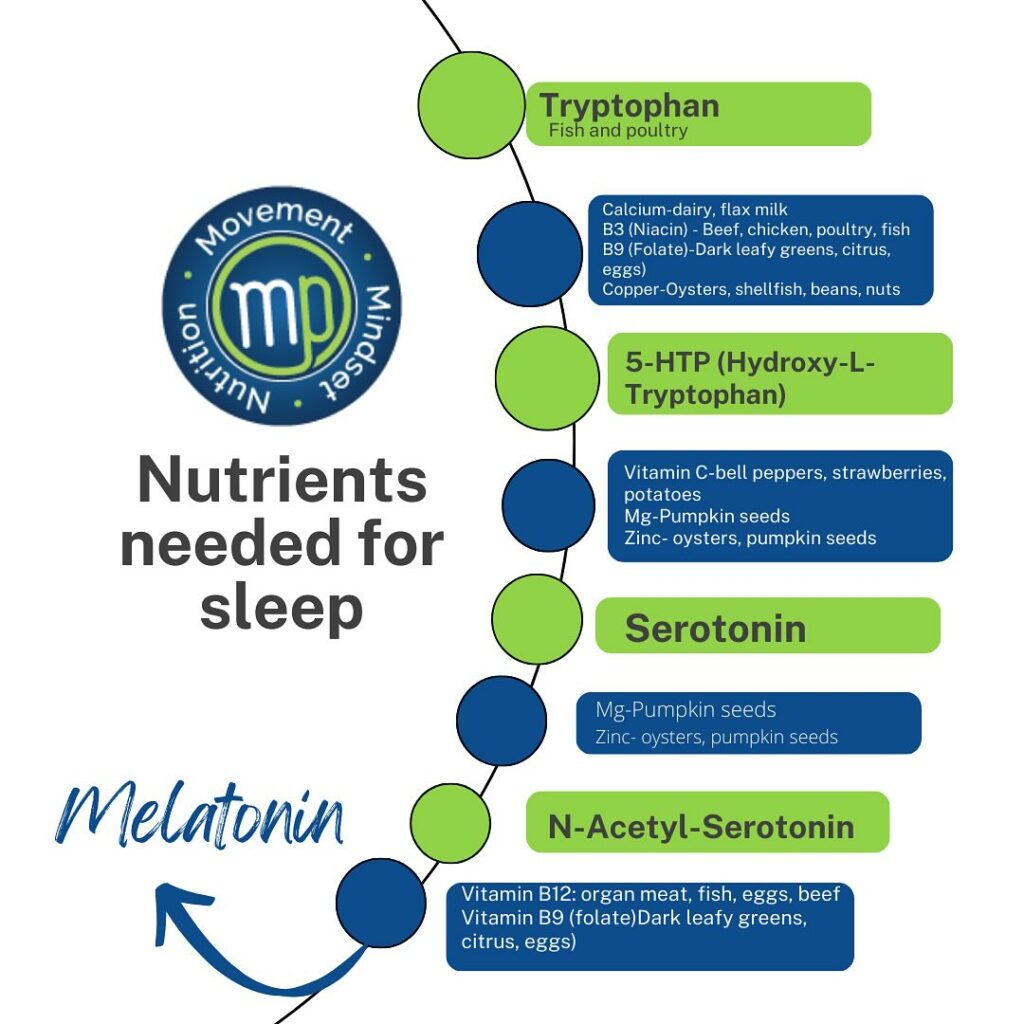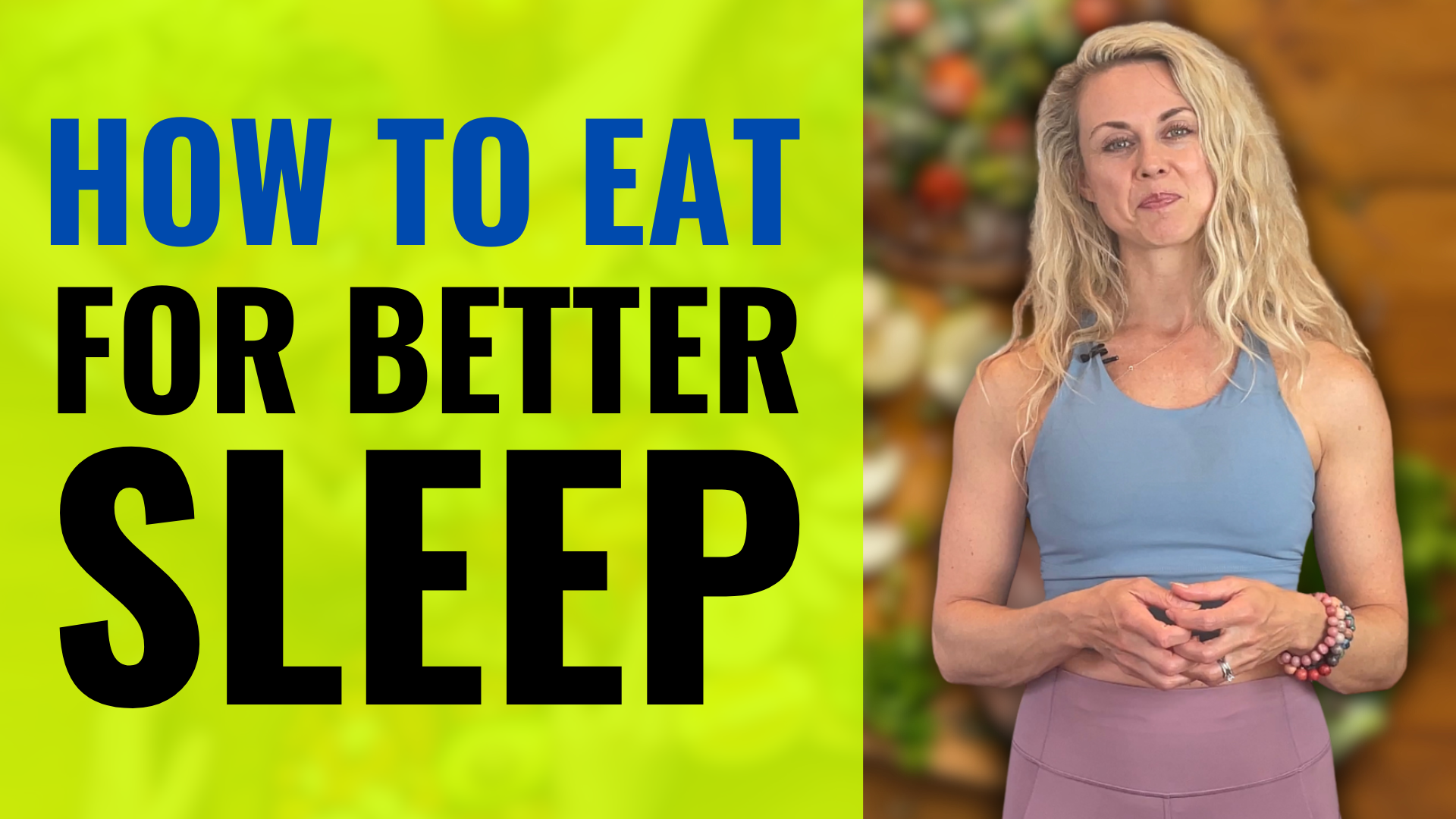Are you having trouble sleeping? Maybe you’ve tried melatonin, sleep medication, other supplementation, or all of the sleep hygiene tips without success. Have you tried optimizing your nutrition for sleep? Here’s what to eat for better sleep.
Rather watch or listen?
The role of nutrition for better sleep
Nutrition is one of the most overlooked aspects of sleep hygiene. We might follow all the sleep hygiene tips—going to bed early at the same time, trying to get morning sunlight, and trying to downregulate before sleep—but so often, no one focuses on nutrition for sleep, and that is what this blog is about today.
We need nutrients for every biochemical reaction in the body. For us to truly thrive, feel energized and motivated, feel great about life, and have a great mood, we need proper nutrition to fuel our brains and our bodies.
As it relates to neurotransmitter production, we need tyrosine, an amino acid that we get from protein sources, to make dopamine. We need glutamine, another amino acid, to make GABA, which helps to decrease feelings of fear and anxiety. And we need tryptophan to make serotonin. So, we’re going to dive into that pathway specifically because serotonin is a precursor for melatonin that is necessary for sleep.
What to eat for better sleep: 8 nutrients you need

Tryptophan
The nutrients you need for sleep to ultimately produce the appropriate amount of melatonin are going to start with tryptophan. We can get tryptophan through protein sources such as fish and poultry. In order for tryptophan to convert to 5-HTP, we need calcium foods. This could be something like dairy, or if you’re dairy-free, it could be something like flax milk.
B3 (Niacin)
We also need B3, which is niacin. This could be beef, chicken, poultry, or fish.
B9
We need B9, folate, which comes from dark leafy vegetables, citrus foods, and even eggs.
Copper
We also need copper, which includes oysters, and if that’s not feasible, then something like shellfish, beans, or nuts.
Vitamin C
Once tryptophan is converted to 5-HTP, which is 5-hydroxytryptophan, we need to convert it to serotonin. Foods high in vitamin C, such as bell peppers, strawberries, or potatoes, will provide the nutrients needed for that.
Magnesium
We also need magnesium, such as pumpkin seeds.
Zinc
We need zinc, such as oysters or pumpkin seeds.
Once 5-HTP is converted to serotonin, then we need to convert serotonin to N-acetyl serotonin. That’s going to require magnesium again. Pumpkin seeds are a great source of this. Zinc, which could be oysters and pumpkin seeds as well.
Vitamin B12
Once it is converted to N-acetyl serotonin, we need to convert it to melatonin. In order to do that, we need Vitamin B12, which could be organ meats, fish, eggs, and beef. B9 is our folate, which can be dark leafy vegetables, citrus foods, and eggs. And there we have melatonin.
Key Takeaway
So, as you can see, it is a complex biochemical process that requires nutrients each and every step of the way. That process starts with protein, which plays a huge role in neurotransmitter production.
One of the best things you can do if you’re not already doing it and you’re not sleeping well is to begin to eat more protein throughout the day. But also, let’s factor in all of those key vitamins and minerals, such as vitamin C, magnesium, calcium, and B vitamins, because all of those are going to influence each and every step in that biochemical process. So, before just grabbing your melatonin supplement, think about what you can do to produce your own melatonin in addition to darkness, of course.
If this was helpful, please give it a like, share it, and subscribe to our YouTube channel, the Movement Paradigm, for weekly tips on mindset, nutrition, and movement. Our goal is to help you live your best life, heal, transform, and, more importantly, thrive.
You can always join us in our app, the Movement Paradigm. We have lots of challenges every other month—everything from movement to the nervous system, nutrition, and so on. And we have a great community of people.
You can also reach out to us for an individual appointment as it relates to the physical pain that you might be having and any emotional issues that you’re dealing with, such as anxiety or depression. If you really want to get to the root cause, please reach out to us.
Other things that might interest you:

